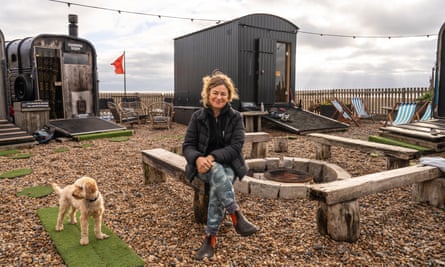
Seaside saunas were just a wisp of a dream until 2018. Now anyone walking along a beach at one of the UK’s main resorts is likely to come across a converted horse box offering heat and steam as a respite from bleak skies and icy winds.
There are now 70 such saunas operating in the UK according to the British Sauna Society, mostly at beaches or lakes, fuelled by the growth in wild swimming and healthy living.
But if the customers have sweated, so have the owners. Finding land, dealing with slow-moving councils and wild seas have all taken a toll. And as the number of saunas increases, local opposition is emerging.
Last week, plans to build a sauna at the ponds in Hampstead Heath in London met objections from the swimmers there. Mark Lamb, the founder of Wild Sauna Community Interest Company, had offered to spend £100,000 to install a sauna near the ponds and manage them for free – the first of 50 such projects – but the Mixed Pond Association said the plans were “unworkable” and the sauna would “change the atmosphere”.
There has been similar opposition to a proposal to site a mobile sauna in a car park by the beach in St Andrews. More than 20 objections from local people have been lodged with Fife council, including Judith Harding of the Royal Burgh of St Andrews Community Council, who said the sauna would “spoil the view over the sea”.
Meanwhile in Bournemouth, another sauna owner withdrew plans for one on Avon beach after the local town council objected. Sam Glyn-Jones and his Finnish wife had hoped to repeat the success of the Saltwater Sauna, which they set up on Sandbanks beach in Poole two years ago.
Glyn-Jones, a surfing instructor who also runs a nonprofit enterprise for surfing, yoga and cold-water swimming, is sanguine about the rejection. “We were offered a patch of land, and we were like ‘we’ll take what we can get’, but when we went through it, we felt it might obstruct the views,” he said.
They have submitted a new application, which would replace six beach huts of the many already on Avon beach, and he believes that it is much more likely to succeed. “We’re on a group chat with other mobile sauna operators – there are over 100 of us. From what I’ve seen on the group chat, it’s been really difficult for other people.”
Although archeologists have discovered evidence of neolithic sweatboxes in places such as Marden Henge in Wiltshire, Britain does not have much of a sauna heritage.
But in 2018, Liz Watson and her friend Katie Bracher set up a pop-up sauna at the Brighton fringe festival. It proved so popular that Brighton council asked them to stay, and now Watson runs Beach Box Spa, a venture that has inspired the seaside sauna movement.
“The council have been really supportive,” Watson says. “We’ve created our own Brighton community that’s very into saunas – they know all the terminology about leaf whisking and Aufguss, and it’s part of the beach psyche.”
The single converted horsebox has been joined by four others, corralled around a campfire on the pebbles along with two plunge pools and an ice bath, and 14 staff. Sitting at the campfire, Watson, a former homeopath, talks passionately about the connection people have with löyly, the Finnish word for steam evaporating from a hot stove, and the importance of introducing sauna rituals from Nordic and Baltic countries, such as leaf whisking – brushing and tapping the skin with twigs and leaves – and Aufguss, a German practice involving waving a towel to move the steam.
Yet despite the support, things still feel more precarious than Watson would like. “I only get short licences from the council. I have to keep reapplying,” she says. “It’s a big pain. If anybody wants to give me a building on a beach, I’m here.”
Operating on a beach presents plenty of challenges. “Getting water on a beach is harder than it sounds,” she says. She collects rainwater run-off from a crazy golf course next door, and all the lights are battery-powered, usually charged by solar panels on site if the sun is good. “Sometimes I have to go home and do it there,” she says. “There’s always something.”
That includes the English Channel. “When we had Storm Eunice [in 2022] we were lucky because there’s a big bank of pebbles in front of us that soaked up the water,” she says. “It got all the way on to the road – we were on a little island.”
Tim Smithen runs Steam Punk Sauna in Dover, a venture the tattooist set up after inking a customer who told him about the new wave of mobile saunas. He decided nearby Folkestone beach was ideal.
“It took a year of talking with the local council at Folkestone for nothing to happen,” he says. Folkestone’s harbour authority stepped in and found a space for him for several months, but now Steam Punk Sauna is in Dover.
Smithen says it has been “really hard work”. He’s had “windburn and rainburn on my face” from standing outside his sauna, and gale-force winds tore off the door. “We basically had stones flying up out of the sea during Hurricane Ciaran.”
Has it all been worth it? “No! Well … there is no other feeling like going inside a wood-fired sauna. The world is just what’s around you. You’re in your own cave in 90 degree heat. It’s just perfect. You can get into bed with the heating on, but there’s nothing like getting into a sauna in your swimwear.”



